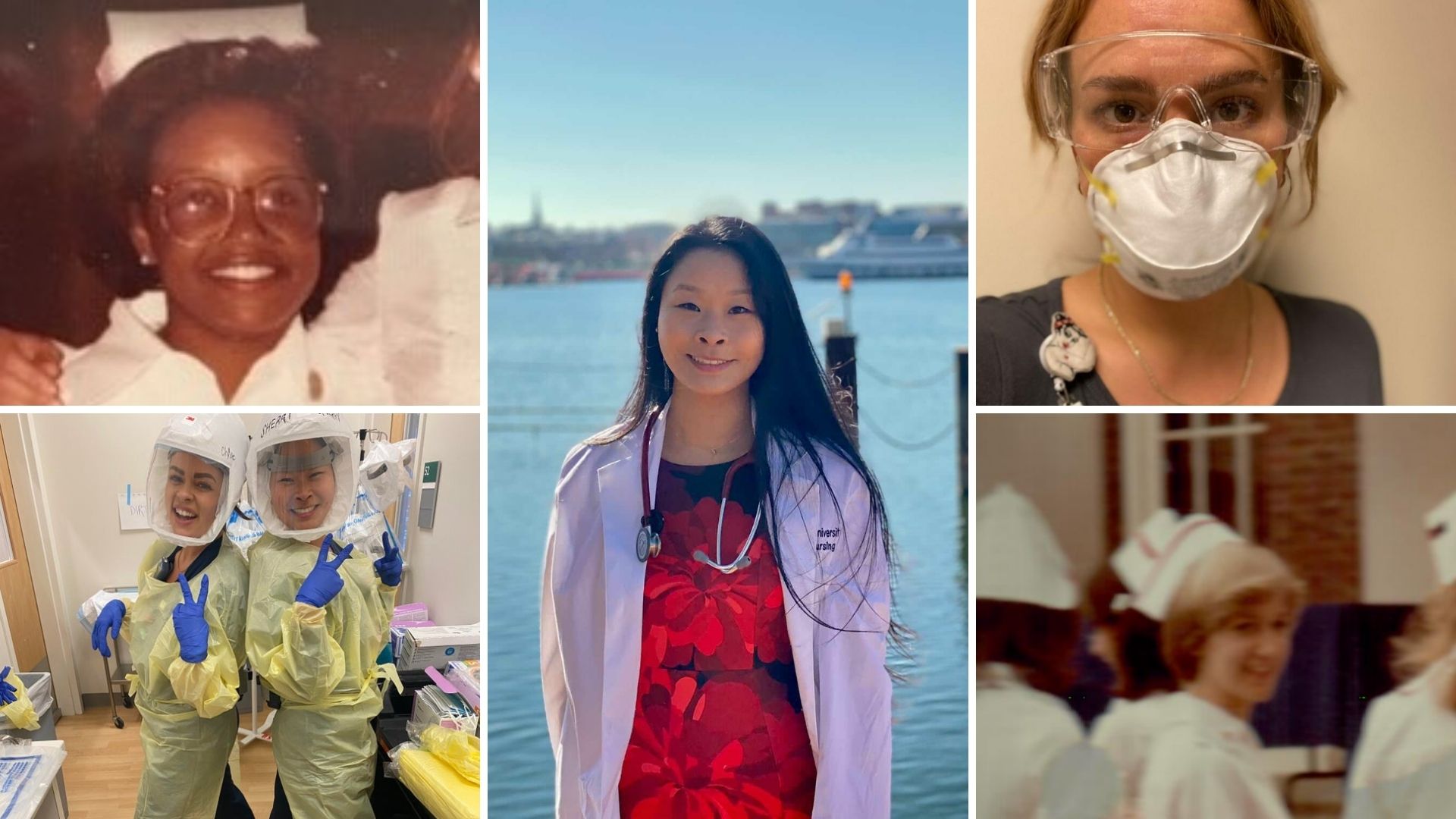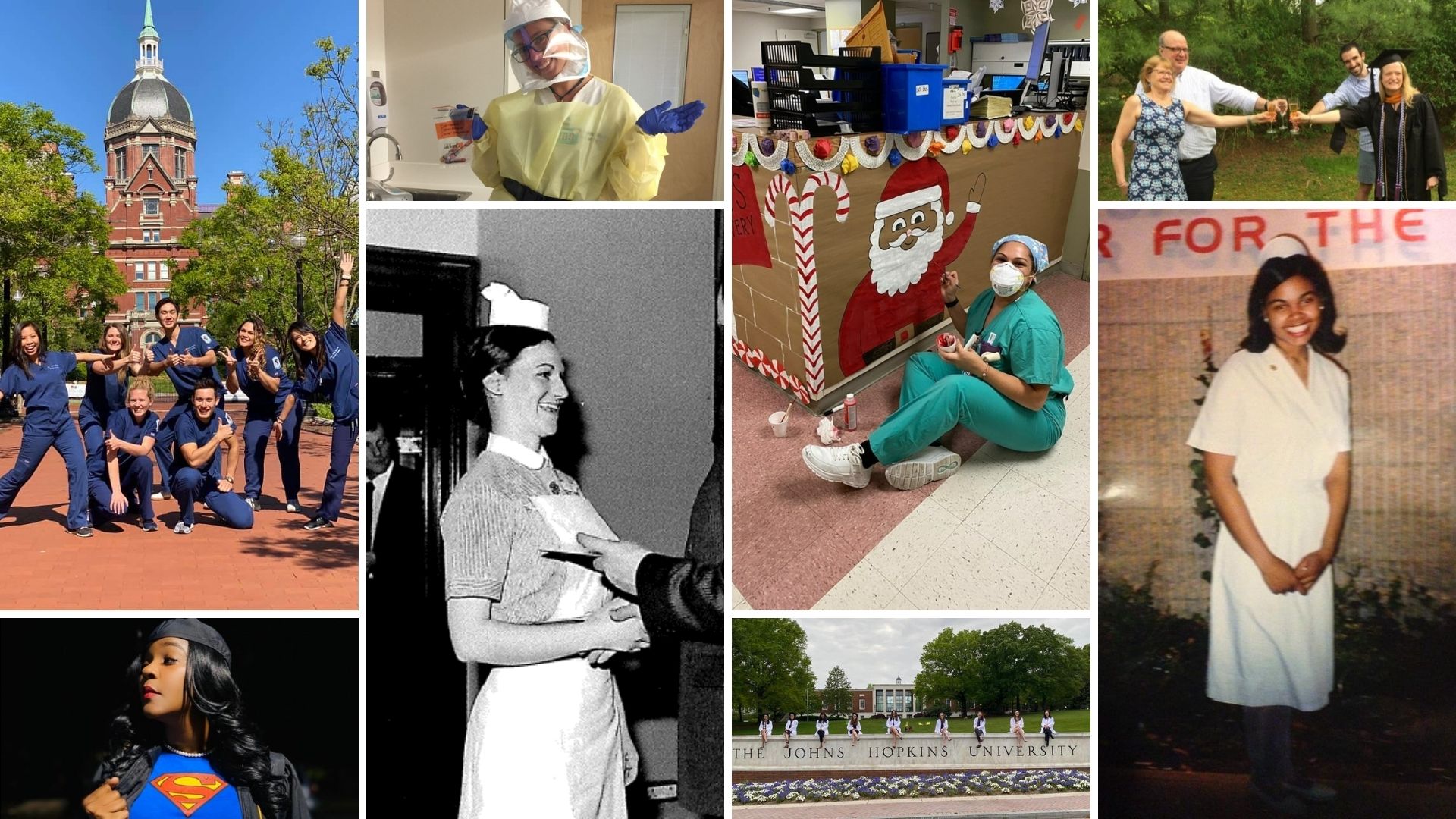What a “Year of the Nurse and Midwife!” This is probably not what you expected when you decided to become a nurse, whether that was a few short years ago or a little longer. And yet here you are, showing the world the heart, smarts, and grit that make nursing the most trusted profession 18 years running. With the year wrapping up, we have a question to ask…
How did it start? How is it going? Share your thoughts, photos and reflections from the beginning until now on the “My First Year as a Nurse” Kudoboard.

Sherry Dong, DNP Nurse Anesthesiology ’23
DNP Advanced Practice Track, Nurse Anesthesiology
Globally, 2020 felt like a bad carnival ride. But I can confidently say that, for better or worse, it was life-changing. I worked on the Medical ICU in the first wave of COVID-19, I got to inspire health care workers worldwide when I was featured CNN World and in Mark Zukerberg’s short film Never Lost.
In May, I embarked on a new adventure into anesthesiology at Johns Hopkins School of Nursing and was elected the first student representative of the inaugural DNP Nurse Anesthesia cohort! Now as I finish the second semester, I am humbled to be co-authoring an upcoming publication alongside renowned researchers at Johns Hopkins Medicine.
Rachel Gillett, MSN, RN ’19
MSN (Entry into Nursing) Program
I never would have thought that my first year nursing would look like this.
I dove headfirst into critical care as an ICU nurse (thinking I could tread water until I learned how to swim) but this pandemic had other plans. I was sent to the “Wild West” of the COVID ICU whilst also transitioning to nightshift and felt totally out of my depth. I felt like I might drown. The truth is that I spent most of this year stressed, frightened, and lonely… but I wasn’t alone. I leaned on my fellow Hopkins Nurse alumni to commiserate, to support each other, and to find some peace admits the chaos.
Now several months into the pandemic, I feel slightly more seasoned; I am more sure of myself and of my skill as a provider. I grew, and I continue to learn every day. I am thankful for the education that I received in the MSN (Entry Into Nursing) program because here I am, still afloat.
Sophia Pan, DNP Adult Critical Care CNS ’21
DNP Advanced Practice Track, Adult Critical Care CNS
Being an ICU nurse in the midst of a pandemic is not something anyone anticipates… ever. During the first surge, we were all chartering the unknown. We faced daily questions about the supply of PPE, which units would convert to COVID units, what staffing model we would use, and if we would even work on our home units. We were all learning together about how to manage this new patient population.
Now during this second surge, we are equipped with more knowledge, have adequate PPE, and learned from our experience back in March, but this surge feels different. It came faster and harder. These patients are incredibly sick, and have lengths of stays that are twice as long as our typical ICU patient. We care for patients that require an external pump to circulate and oxygenate their blood (called extracorporeal membrane oxygenation, or ECMO). We are still battling normal ICU turnover, and trying to orient new nurses to become competent cardiac surgery nurses after the pandemic, but training them in a COVID environment has been difficult and has required creativity and flexibility.
COVID-19 patients have become the new normal in the hospital, but even though we know what to expect and what to do, this is a true test of our emotional and moral resilience.
Anne Batchelder, MSN, MPH, RN, ’20
MSN (Entry into Nursing) Program
This has not been the easiest time to be a new nurse. After graduating remotely in my own living room, we have so much to learn and are doing so in the midst of a pandemic, while wearing a painful N-95 mask and annoying face shield. But I am very proud to be a nurse. In this challenging time, we stepped up and took care of people in need, even with a risk to our own health.
In September, I started as a psych nurse in an eating disorders unit at Sheppard Pratt. While in many ways, I am not caring for patients with COVID – COVID is a big part of my experience so far. On my first day on the unit, a staff member tested positive and all of the patients were sent into isolation. Treatment for psychiatric conditions includes group therapy session and time in a therapeutic milieu, all of which is not possible in isolation. While the hospitals fill up with patients with covid, many psychiatric services have reduced – out-patient services in many places are closed and are replaced with virtual treatment. We see patients trying to manage their treatment plan and have fewer treatment options once they discharge and that puts them at serious risk of relapse. Furthermore, the COVID-19 pandemic and its associated isolation have detrimental effects on mental health. I see that in my hospital and also in my life outside the hospital. These are really serious complications and we will see these effects for years to come.
Prior to nursing school, I worked in public health and in politics. Now more than ever, it is important for nurses to be part of public health solutions. This covid pandemic doesn’t have to be like this and we as the most trusted profession, as leaders, as educators, need to build the political will to improve public health.
As I continue to become the nurse I want to be, I know COVID has and will shape my journey. And I hope it will shape the importance we place on both public health and mental health.
Ashley Sayles, CRNP, ’17
Bachelor’s of Science in Nursing, ’14; MSN (Pediatric Primary Care) NP ’17
Clinical Instructor
This has definitely been a challenging year for a pediatric primary care provider. We’re constantly weighing the pros and cons of seeing our patients in office or virtually, keeping patients and parents calm, and navigating continued management of chronic care with significantly more limited services than before.
With that said, I’m happy and proud to have been able to continue to offer the best care that I can to my patients. It’s difficult, but we’re getting through as a team.
